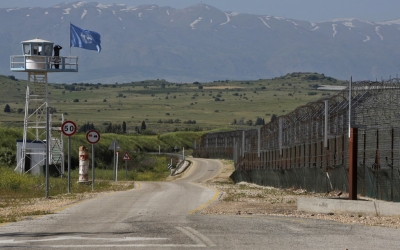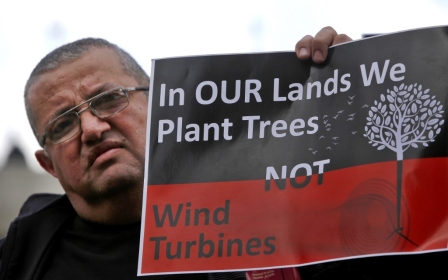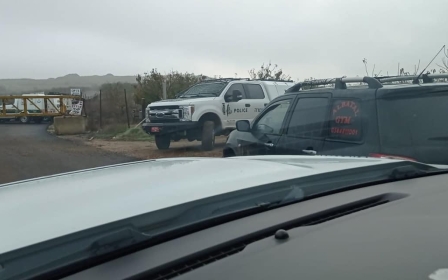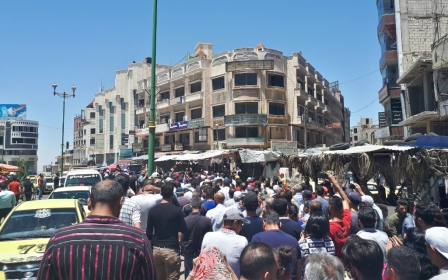Israel-Syria prisoner swap: Two Syrian shepherds to be repatriated
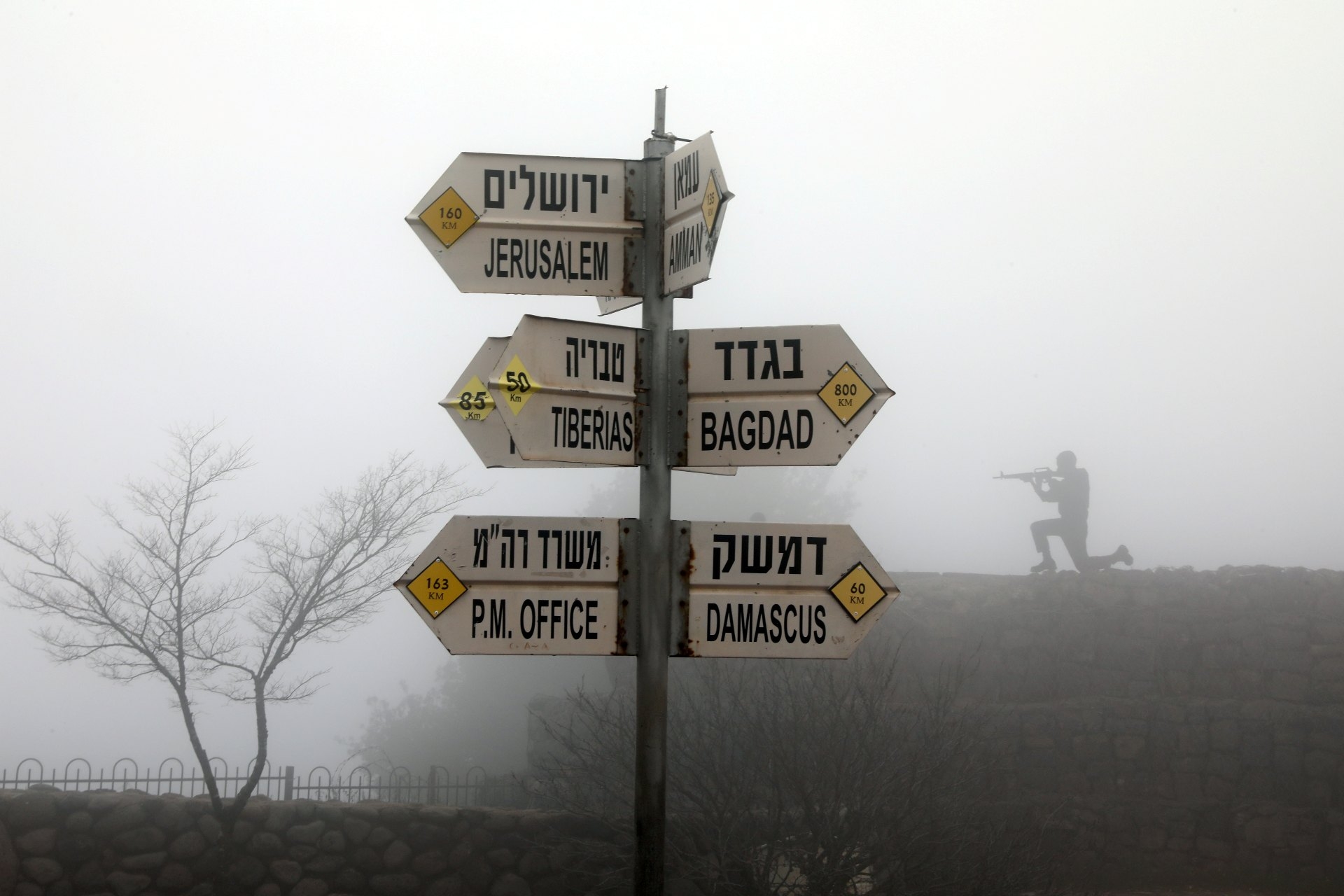
Israel is reportedly repatriating two Syrian shepherds as part of a Russian-sponsored deal to free an Israeli woman who entered Syria and was detained this week.
Israeli daily Haaretz reported that the Syrians, who entered Israeli-controlled territory a few weeks ago, had been handed to the Red Cross for transfer at the Quneitra crossing on Thursday.
Their return was greenlit by Israel's political leadership, according to an Israeli army spokesperson
This development is the latest in an unusual series of Russian-mediated negotiations, as Israeli attempts to secure the return of its citizen.
On Wednesday, it appeared an exchange was on in return for two Syrians from the Israeli-occupied Golan Heights.
New MEE newsletter: Jerusalem Dispatch
Sign up to get the latest insights and analysis on Israel-Palestine, alongside Turkey Unpacked and other MEE newsletters
However, the deal was complicated that evening after the two Syrians, Nihal al-Maqt and Dian Kahamuz, refused to be transferred to Syria and insisted on remaining in their hometowns in the occupied Golan Heights.
Nihal al-Maqt, who is serving a suspended prison sentence, and Diab Kahamuz, who is in an Israeli prison, rejected their proposed transferral to Syria because they want to be in their hometowns in the Israeli-occupied Golan instead.
Official Syrian media had talked up Damascus's role in freeing Syrians from Israeli prisons, including those like Maqt and Kahamuz, who come from territory occupied by Israel since 1967.
"Until now the talks are going on [with Kahamuz and Israel Prison Service] to release him to his hometown Ghajar in the occupied Golan Heights, as Kahamuz insists to be released there," the Palestinian Prisoners' Club said in a statement.
Kahamuz, 34, was arrested in 2016 and sentenced in 2018 to 14 years in prison for smuggling explosives he received from Hezbollah into Israel from Lebanon. He is currently incarcerated in a prison in the Negev desert.
Maqt, meanwhile, is serving a three-year suspended sentence from her home in the Golan town of Majdal Shams.
She told Syrian TV on Wednesday that Israeli forces came to her house to inform her of the decision to release her to Damascus, but she refused to leave.
Israel had freed her brother Sidqi al-Maqt, who spent 11 years in an Israeli prison for espionage and was released in January 2020.
Sidqi al-Maqt was released in what Israel called a "goodwill" gesture in return for the Russian-assisted repatriation in 2019 of the body of Zachary Baumel, an Israeli soldier who was declared missing in action after a 1982 tank battle with Syrian forces in Lebanon.
According to Syria's official Sana news agency, the Israeli woman in Syrian custody crossed over into Quneitra province by mistake. Israel media said the woman is 25-years old and from the ultra-Orthodox settlement of Modiin Illit in the occupied West Bank.
Israeli Prime Minister Benjamin Netanyahu declined to comment on the Sana report during an interview with Israel’s Army Radio on Wednesday, but said he was using his connections with Russian President Vladimir Putin to deal with a "life-saving situation".
"I am using my personal connections with President Putin to solve the problem. We are in the middle of sensitive contacts," Netanyahu said. "We are acting discreetly and responsibly to handle the matter, and I believe we will solve it."
The Golan Heights: Why it matters
+ Show - HideOfficially part of Syria since the country’s independence in 1944, the Golan Heights is a strategic plateau straddling Israel and Syria and overlooking southern Lebanon.
It was captured by Israel during the Middle East war of 1967 and subsequently annexed in a move never recognised by the international community.
The Golan is recognised as part of Syria by the United Nations. UN Resolution 242 calls for Israel to withdraw from the Golan and other occupied territories including the Gaza Strip and the West Bank.
However, Israel has repeatedly refused to do so and in 1981, it formally annexed the Syrian territory.
A UN peacekeeping force has patrolled the demarcation line between Syrian and Israeli-controlled areas of the Golan since 1974.
Israel has constructed settlements that are illegal under international law in the occupied territory and settled its citizens there.
Some 20,000 Israeli settlers currently live in the Golan, alongside around 26,000 of the territory’s native inhabitants, who are predominantly Druze and identify as Syrian.
Since the Syrian war erupted in 2011, Syrians in the Golan taking Israeli citizenship has become more common, though the vast majority reject it.
The Golan is thought to provide around one-third of Israel's fresh water supply. Water from the territory flows into the Sea of Galilee and Jordan River.
Other than its strategic significance - the Golan is the only land border between Israel and Syria - the territory is also used by Israelis for leisure purposes. The area counts an Israeli ski resort and several vineyards.
On Tuesday evening, the Israeli cabinet convened for deliberations over a "humanitarian issue" related to Syria. The name of the Israeli woman has not been made public, nor when she illegally entered Syria and was arrested.
Israel’s Haaretz newspaper reported that Meir Ben-Shabbat, head of the domestic intelligence agency Shin Bet, and Yaron Blum, who handles prisoner of war issues, were in Russia negotiating the exchange.
Israel seized the Golan Heights from Syria in the 1967 Middle East war, later annexing it in a move never recognised by the international community.
The Syrians who live in the plateau are mostly Druze and the vast majority do not recognise Israel's sovereignty.
Middle East Eye delivers independent and unrivalled coverage and analysis of the Middle East, North Africa and beyond. To learn more about republishing this content and the associated fees, please fill out this form. More about MEE can be found here.


